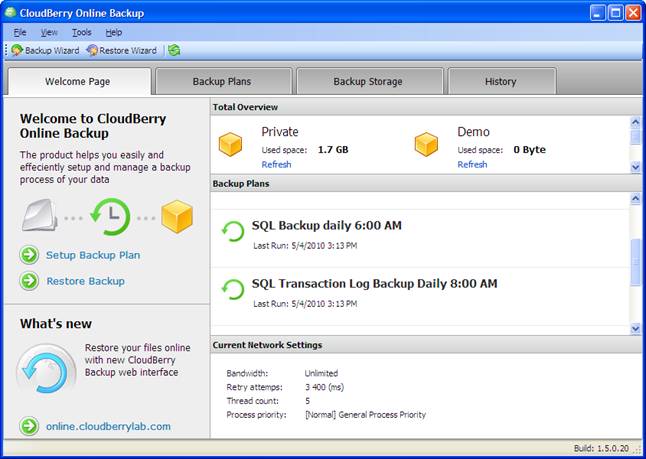

- #Cloudberry backup for ms sql server how to
- #Cloudberry backup for ms sql server manual
- #Cloudberry backup for ms sql server full
- #Cloudberry backup for ms sql server software
I am in need of advice on how to setup a Air gap backup?I read an article awhile back from Roger at KnowB4 he said a true Air Gap Backup cannot be accessed from your network I hope I heard that right. if this is the case it makes sense so how do you set t.
#Cloudberry backup for ms sql server software
SQL Server has all the tools built-in so many pros prefer to create local backups using the native tools and let the 3rd party backup software back up those somewhere else for safety. What a lot of admins don't realize is that SQL Server backups/restores are much more involved than simply "make a copy of the files." A well-done DR plan for SQL server allows point-in-time recovery and various high availability options which will break if the backups are not taken in a transactionally-aware manner.
#Cloudberry backup for ms sql server manual
Restoring is not so much fun, it’s always been a manual task for me with this until. I just wanted a tool that would create a backup file compress it and ftp it. I’m guessing you may need help from a real DBA, but just throwing this out there. SQL level backups and VM levels backups compliment each other.ĭon’t know how this tool would work on a 10TB dB but this is what I use. A big one like this needs to have some DBA love and sequence what should be done at SQL level. It's one thing for a late night VSS routine to backup a couple GB SQL lite database that nobody touches after 5pm. A lot of those 3rd party apps claim 'X' but in the end just rely on VSS procedures, and there's not much more worthless than a 10TB crash consistent database. If someone cant figure out how to do it properly, dont blame the tool.Ī'yup. In fact, under the hood, a lot of 3rd part backup apps do just that - they execute t-sql to do the backup.Ģ - dont blame SQL Server if someone doesnt know how to set up backups properly - PEBKAC.ģ - you can validate a backup with t-sql just as well as any 3rd party backup application.īottom line - DBA's love backing SQL Server up the way SQL Server wants to be backed up - using the "backup database" command. You can use t-sql to write to tape if you want. You dont need to use a 3rd party app because:ġ - Backups running to the local disk is not your only option. Backup admins love them because they (usually) always show success, even if they don't do what you think they're doing. Maintenance plans are garbage and DBA's do not love them.ģrd party backup utilities like to play loose with how SQL Servers need to be backed up. T-log backups are part and parcel of certain high availability scenarios. Good DBAs are well aware of the need for non-local and off-site backups and so forth.Īnd their use extends far beyond just rolling back transactions. There are others who use well-known and tested 3rd party tools that are SQL-aware (and not all are). He's not talking about maintenance plans - SQL Server pros avoid them and use native t-sql to make their backups with Agent jobs and do so in a way that meets every one of the points you make. 3rd party tools usually have the ability to validate the data without having to restore a 10TB database every time. You've no idea if they're corrupt until you try to restore them.

Those backups are just sitting there on disk.
#Cloudberry backup for ms sql server full
3rd party tools often are able to stretch out the periods between full backups, or even rebuild full/incremental strings on the fly as retention policies prune out unneeded versions over time.


 0 kommentar(er)
0 kommentar(er)
